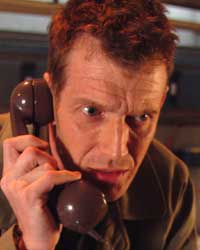

Transcript of Professor Quatermass' address to the press, 26 March 2005, 8.30am
"Good day to all those watching. My name is Professor Quatermass, and I am the head of the British Experimental Rocket Group. That means I'm in charge of the BR7 experiment - three very brave men, in one remarkable rocket, currently waiting to lift-off. It's an experiment that means a great deal to me, as I am not only the head of BERG, but also had a lot to do with the design of the rocket craft they will be travelling in.
To me, this is humanity's most thrilling foray yet beyond the Earth's sustaining atmosphere. The three astronauts manning the BR7 - Victor Caroon, Charles Greene and Doctor Ludwig Reichenheim - will be travelling over a quarter of a million miles away from our planet. After launching from Tarooma Range in Australia, they'll accelerate to a speed of 18,000 miles per hour, then set course for the apogee - the furthest point from Earth that mankind has ever travelled - of their flight. Then the rocket's great engines will be stilled, so that they can conduct a series of experiments in the icy vacuum of space.
They'll need to be calm, collected and have their wits about them during the trip, as they'll be conducting many demanding and complicated experiments. But I have the utmost faith in them. With their help, the BR7 will return not only having made a place for BERG in the record books, but also advancing the cause of human knowledge that bit further.
I hope that this mission will do something toward raising the public's interest in space exploration, which has been near-absent for far too long. Perhaps, if the BR7 launch is the success we all hope it will be, it will inspires some of today's young people to get involved in science, maybe to become the astronauts of tomorrow. Or even to be the sponsors of missions in years to come. I'll consider my effort well spent if that happens!
Many thanks for listening to me, and good luck to astronauts Greene, Caroon and Dr Reichenheim."
